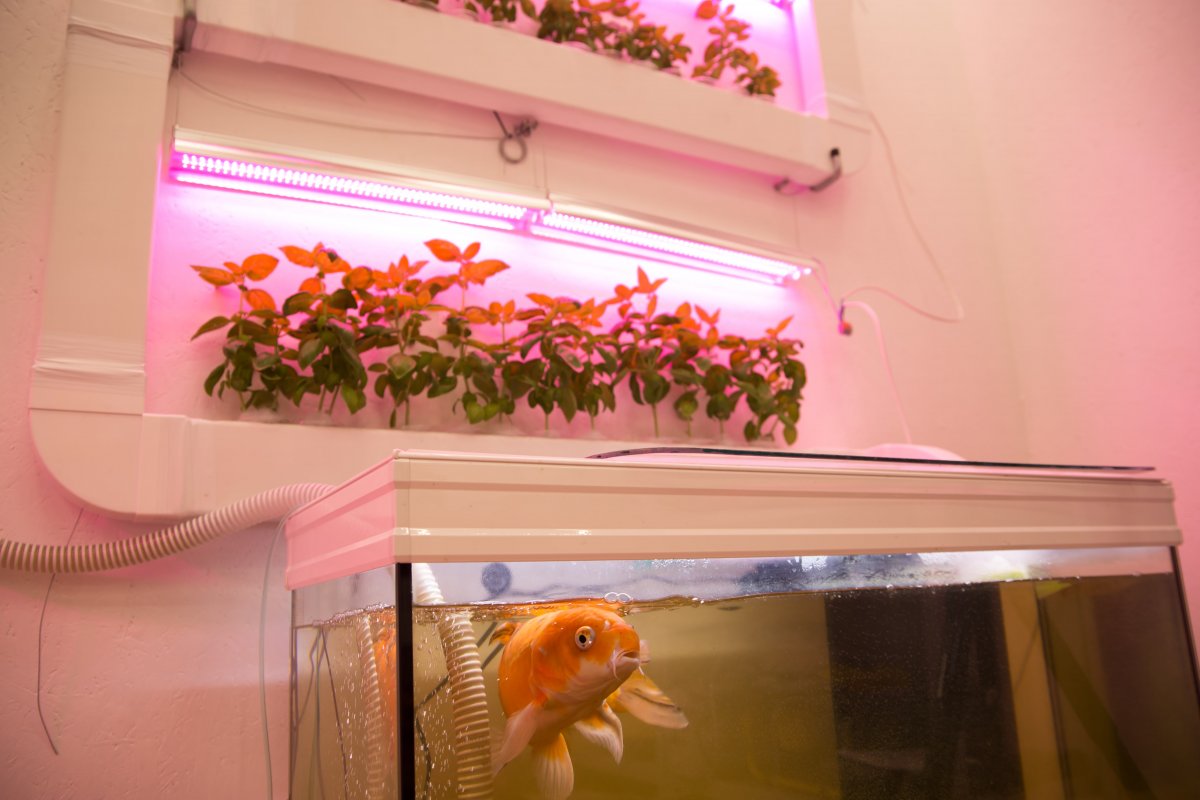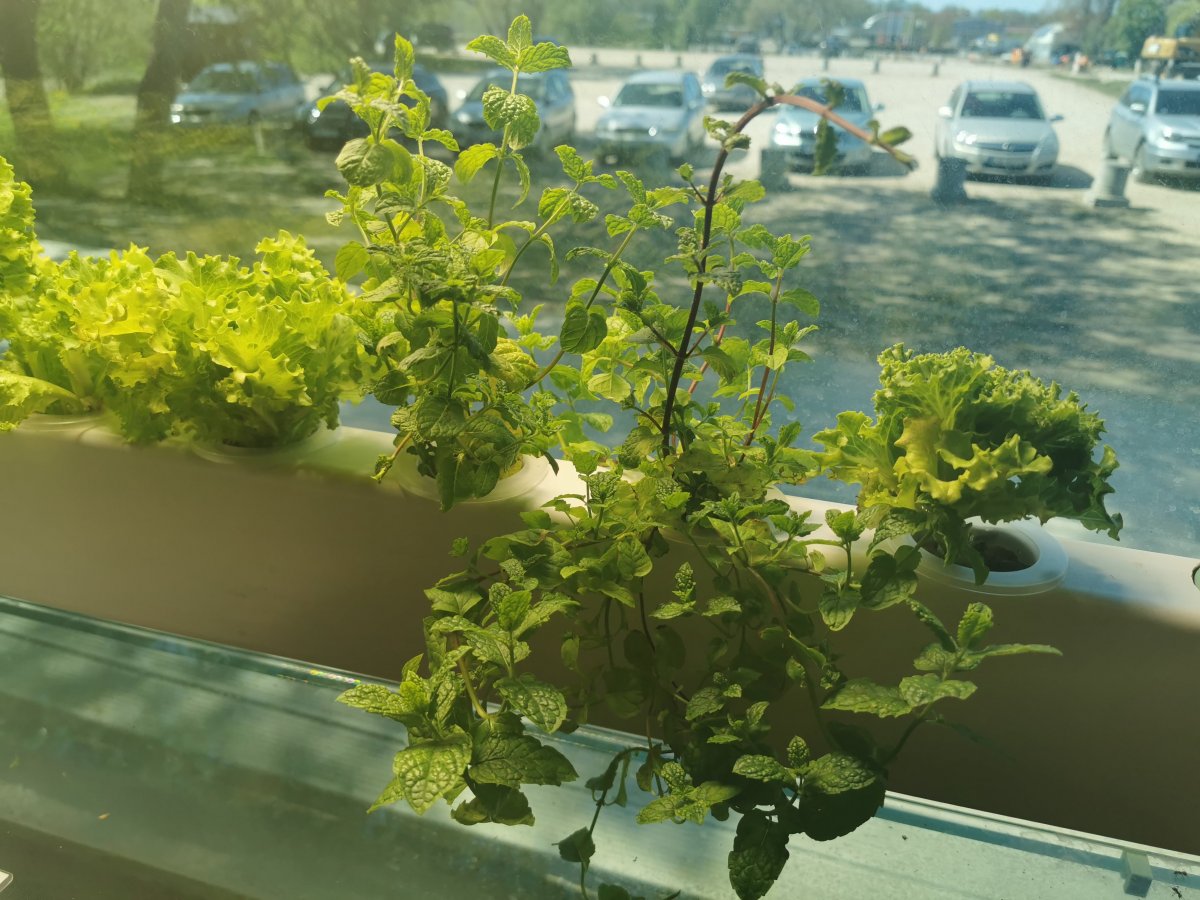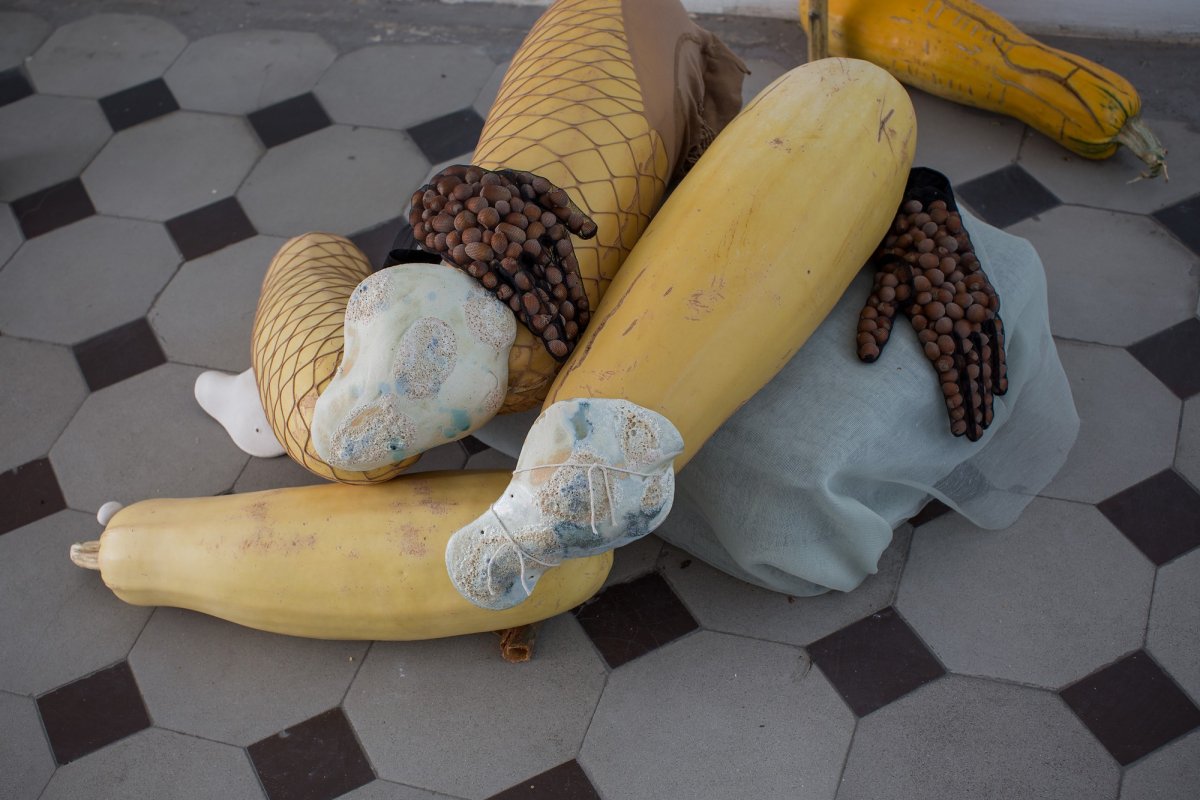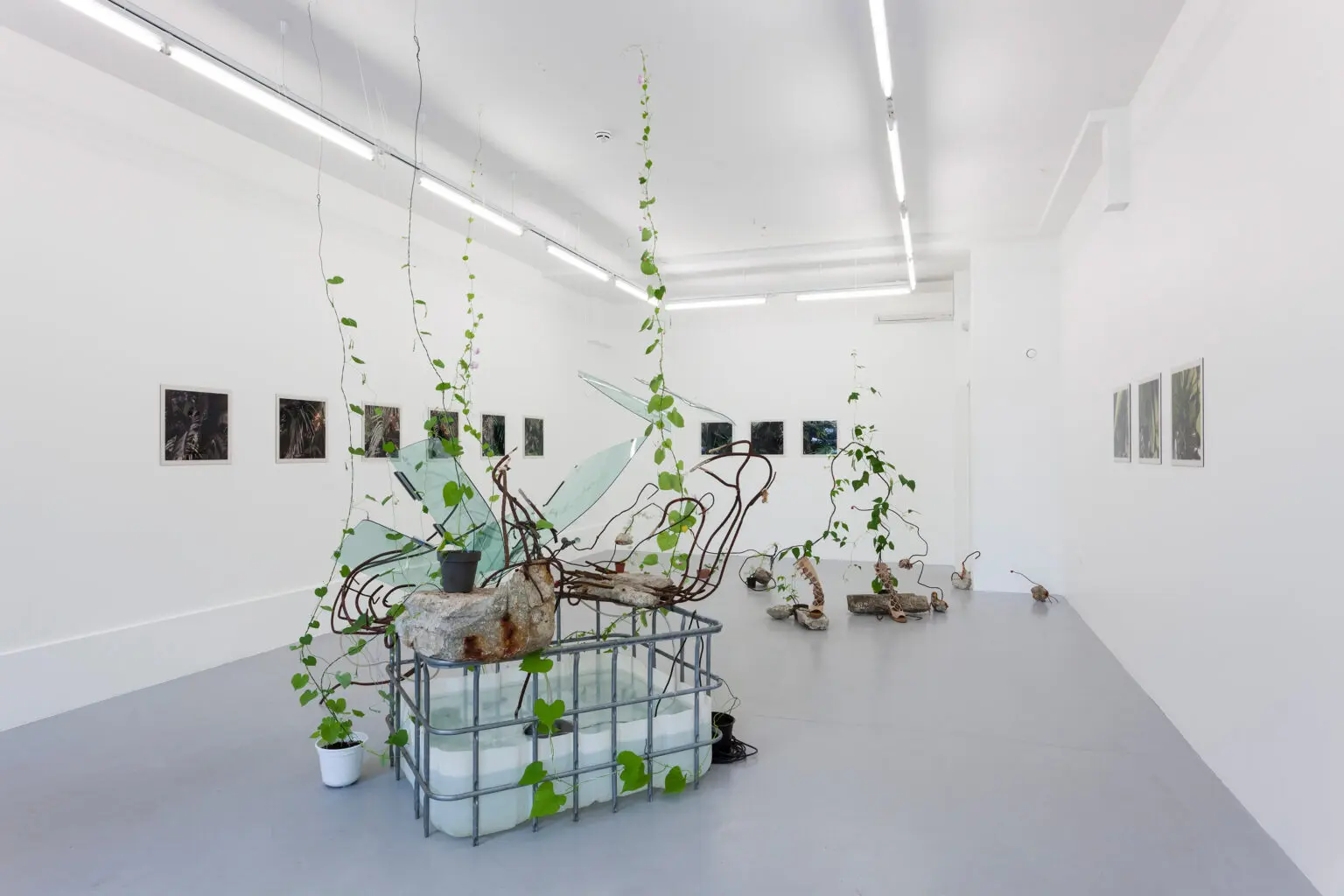
Image: Maija Demitere, Aquaponica, House of Nature in Liepāja. 2021.

Image: Maija Demitere, Aquaponica, House of Nature in Liepāja. 2021.

Image: Mari-Leen Kiipli, Nanshe Gone Fishing, 2021.

Image: Mari-Leen Kiipli, Husa & Paul Kuimet, Crystal Grid, 2020.
Next Tuesday, May 24, at 6 to 8 pm EEST we invite you to join the online discussion “Gardening and self-provisioning as an art practice”, where artists and researchers from the Baltics, will discuss gardening as an artistic practice and the role of urban gardens in contemporary art and society in general.
The discussion will take place on Facebook:
The recording of the discussion is available on our Vimeo page:
https://vimeo.com/showcase/9584362
Participants: Maija Demitere, Evelina Simkute, Mari-Leen Kiipli, Laurie Cluitmans, Laura Kuusk.
Moderators: Linda Kaljundi and Ieva Astahovska.
Organised by LCCA in collaboration with KUMU Art Museum.
Urban and allotment gardens have a long history, and in recent years they have again been attracting new interest and popularity across the globe. In urban and sustainability planning, community gardening is often promoted as providing a greener environment, more inclusive public space and mental wellbeing. At the same time, the fortunes of historical urban and allotment gardens reveal the fragility of self-provisioning and the contradictions behind urban planning, when developers see decades-old allotment gardens as worthless relics of the past and “degraded” territories that should be gentrified and developed according to capitalist principles.
In the post-Soviet countries, allotment gardens have characteristics specific to the region. Colonies of small garden plots on a city’s outskirts were often allocated to the workers of different enterprises, and as recreation getaways or dachas they were especially important for people inhabiting mass housing districts. The vital importance of these areas has become newly visible during the Covid pandemic.
The present functions of urban gardens, but also their global, colonial and regional histories and heritage are increasingly addressed by artists, making gardening and plants an integral part of contemporary artistic practice. Artists engage gardens as micro-models of our society, incorporating its strengths and weaknesses, histories of segregation and dreams of equality, all while bringing to the fore ecological, communal and participatory concerns. As with all environmental art practices, however, this also raises questions concerning the role of art in the Anthropocene. What are the possibilities of working with gardening as an artistic practice? How can we position ourselves between urban, ecological or community activism and art? Is it even necessary? What ethical and other issues relate to engaging plants and people in these artistic projects?
This discussion is part of the research and exhibition project “Reflecting Post-Socialism through Post-Colonialism in the Baltics”, organized by the Latvian Center for Contemporary Art in Riga in collaboration with Kumu Art Museum and the research project “Estonian Environmentalism in the 20th Century” (both Tallinn). The project analyses the imprints of post-socialism and post-colonialism in the Baltic region, here exploring them through the prism of environmental history and the current ecological crisis.
ABSTRACTS AND PRESENTER BIOS
Maija Demitere, “Everyone Should be Gardening”
For me it is hard to understand how and why certain practices are “normal” and common—like eating meat, neglecting to recycle, consuming fast-fashion and engaging in senseless shopping. In my life I have normalised some eccentric behavior—for example, having an active aquaponics system in my living room. Sometimes I forget that what is “normal” for me, is actually a bit weird. For about a decade now I’ve developed cheap and easy, lazy, low-effort gardening methods and prototypes and I have tried to convince the public to copy my practices and to think about sustainability and our impact on the planet. I have been constantly disappointed that people are not appreciating my efforts. Now I am focusing my research on describing “normal” human habits, in order to better understand how to convince people that gardening is the best thing ever and everyone should do it.
Maija Demitere is an artist-researcher focusing on slow media art and deep sustainability. In her artistic practice and research, she is trying to describe what role nature / the natural plays in the everyday life of a “normal,” modern person.
Evelina Šimkutė, “Šilainiai Project”
Evelina will speak about the Kaunas Fort no. 8, where she has been working since 2016, the talk will focus on community action that is urban gardening.
About the project at the fort:
Heritage management institution, local arts initiative, urban gardening community and passionate heritage volunteers working together for 5 years to change the abandoned First World War heritage site to a resilient community hub in harmony with nature and history.Largely based on voluntary effort and with limited funds, this has been a long, open co-creation process which has led to a unique place for arts and culture, biodiversity and community urban gardening with sustainability at heart.
Evelina Šimkutė is an artist and cultural producer working with socially engaged art and creative placemaking practices. Since 2015 Evelina is leading ‘Šilainiai Project’ – creative platform in housing estate of Šilainiai, Kaunas, which focuses on active engagement with the site and local community through a variety of creative processes – collaborative archives, workshops, artist residencies, talks and events. Currently Evelina Šimkutė is focusing on long-term strategies for sustainable city and community in the neigbourhood, coordinating Šilainiai Urban Gardens initiative as well as taking the practice of regenerative placemaking to different regions across Lithuania and abroad.
Laurie Cluitmans, “The Botanical Revolution: On the Necessity of Art and Gardening”
For centuries, the garden has been regarded as a mirror of society, a microcosm of the larger world, reflecting on a small scale the broader relationships between nature and culture. The garden is not a neutral space. It is not merely a retreat, safe and secluded, or a place to let escapism run wild. The garden is also a place of privilege and control. Contemporary artists are once again turning to the garden as the preeminent site for the interrogation of the relationship between nature and culture, wilderness and order, freedom and control. What can we, together with these artists, learn from the garden? In this presentation Laurie Cluitmans will reflect on the exhibition The Botanical Revolution: On the Necessity of Art and Gardening that took place at the Centraal Museum in the Netherlands.
Laurie Cluitmans works as Curator of Contemporary Art at the Centraal Museum in Utrecht where she has curated exhibitions with, among others, Basel Abbas and Ruanne Abou-Rahme, Philipp Gufler, Tamara Henderson, Wendelien van Oldenborgh, Jaya Pelupessy, Janis Rafa, Tabita Rezaire and Jessica Stockholder. In 2016 Cluitmans was awarded the Prize for Young Art Critics for her essay “The Possibility of a Garden,” on the gardens of Derek Jarman and Ian Hamilton Finlay. This essay led to wider curatorial research into the garden as a metaphor in times of climate change, culminating in the exhibition The Botanical Revolution at the Centraal Museum, Is it possible to be a Revolutionary and like Flowers? at Nest art space in The Hague and the publication On the Necessity of Gardening: An abc on art, botany and cultivation.
Mari-Leen Kiipli creates photos, videos and installations that focus mainly on the unspoken, cognitive features of spaces and situations. She is interested in old myths and stories in the modern context, such as the myth of the end of the world or the tales and use of various plants. Through these stories, she explores humanity’s relationship with nature. With her installations, she sharpens the viewer’s attention to light, transparency, reflections, shadows, colour, sharpness, texture, movement, sound and other perceptible qualities. To do this, she uses various materials, found objects, plants, slow-motion videos. In videos and photographs, she depicts her own focused and sensitive presence or even improvisational movement in found places, such as an abandoned house or industrial landscape, forest, field or greenhouse.
Laura Kuusk is an artist who lives and works in Tallinn. Kuusk mainly uses photography, video and installation mediums in her work. Most of her works are connected to recycling anthropological visual (found) materials. Her latest works address the identity construction and its’ links to visual intertextual materials. Amongst her latest exhibitions are "Dear Algoritm," at Tallinn Art Hall gallery (2020, curated by Niekolaas Johannes Lekkerkerk), "People Like You" at Pärnu City gallery (2019), "New Chic" at Riga Photomonth (2018, curated by Arnis Balcus), “Image Drain” at Tallinn Art Hall (2017, curated by Anthea Buys) and “Flatland” at Positiiv Gallery (2016). She has initiated an ongoing series of events – Silent Sessions – together with Camille Laurelli.